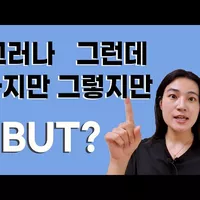(89) BUT in Korean ? 그러나 그런데 하지만 그렇지만 - YouTube
(89) BUT auf Koreanisch ? 그러나 그러나 그러나 그러나 그러나 - YouTube
(89) BUT in Korean ? 그러나 그러나 그러나 그러나 그러나 - YouTube
(89) MAIS en coréen ? 그러나 그러나 그러나 그러나 - YouTube
(89) BUT in Korean ?
안녕하세요 그냥 한국어 지은입니다
여러분 그런데, 그러나, 그렇지만, 하지만
Everyone 그러나, 하지만, 그렇지만, 그런데 you know this?
이거 아시죠? 이거 무슨 뜻이에요?
What does this mean?
앞의 내용과 뒤에 내용이 반대 경우에
You would have learned that we write this
우리가 이것을 쓴다고 배웠을거예요
when the preceding and following are opposite.
그런데 왜 이렇게 많은 걸까요?
But why so many?
이게 차이가 있는 걸까요?
Does this make a difference?
이번 영상에서 제가 간단하게 사용하는 방법을 알려 드릴게요
In this video, I will show you how to use it simply.
이것은 크게 두 가지로 나눌 수 있어요
This can be broadly divided into two
첫 번째 앞에 내용과 뒤에 내용이 반대가 되는 경우
If the content before the first and the content after the end are opposite, in that case
그 경우는 네 가지 다 비슷한 뜻으로 쓰고
all four have the same meaning and can be interchanged
서로 바꿀 수도 있어요
여기서 한가지 알면 좋은 것은
One thing to know
'그러나' 는 대부분 글을 쓸 때나
공식적인 뉴스, 발표에서 많이 쓰기 때문에
평소에 말에서는 그러나를 별로 쓰지 않아요
그래서 그 때는 다른 것을 쓰시면 좋고
그리고 말을 할 때
그렇지만, 그런데 두 가지는 조금 짧게 말해요
'그렇지만' '그런데' these two things are shortened
그렇지만은 그치만, 그런데는 근데
그렇지만> 그치만 , 그런데 > 근데
이렇게 한국 사람들이 말을 한답니다
this is what Koreans say
그럼 이 경우 예시를 한번 볼까요
So let's look at an example in this case.
집에 차가 있어요 그런데 저는 항상 지하철을 타요
I have a car at home, but I always take the subway
나는 이 신발이 너무 마음에 들어 하지만 너무 비싸
I love these shoes, but they are so expensive
이런 식으로 사용을 할 수가 있고
and in this case you can swap them all out
이런 경우에는 모두 다 바꿔서 써도 같은 뜻이랍니다
두 번째 그런데에 다른 뜻이 있어요
그런데는 또 두 가지 용도가 있는데
첫 번째가 방금 말한 것처럼
앞의 내용과 뒤에 내용이 반대가 될 때 사용을 하고
두 번째 뜻은 앞에 내용과 관련 있지만
화제를 조금 바꿀 때 써요
이게 무슨 뜻이냐 하면
이번 기회를 통해서 제가 설명을 드릴게요
오늘 데이트해 근데 어떤 신발이 더 나아
이 문장에서 '근데'는 BUT처럼 해석을 이상한 문장이 돼요
In this sentence, '그런데' becomes a strange sentence to interpret like BUT.
이 경우의 그런데 두 번째 앞에는
In this case, it is the secound '그런데'
앞에는 데이트 이야기를 했는데
at the beginning we talked about dating,
조금 주제를 바꿔서 옷에 관한 얘기를 해야 하잖아요
but we have to change the subject a bit and talk about clothes.
그럴 때 영어 By the way 처럼 초대를 바꿨어요
At that time, we changed the topic like in English By the way
그래서 '근데' 라고 한 거예요
That's why we said '근데'
그래서 '근데' 는 반대되는 뜻으로도 많이 쓰이지만
So, '근데' is often used with the opposite meaning,
사실 평소에 말을 할 때 화제를 전환하는
이 표현으로도 많이 쓰여요
이거 어떻게 쓰는지
이해를 잘 해두시면 좋을 거 같아요
이번 영상에서 우리 4가지 '반대' 표현 비교해 봤고
어떤 차이가 있는지
어떻게 쓰는지 간단하게 같이 봤어요
이변에 대해서 궁금한 점 있으시면 댓글 달아 주시고요
우리는 다음 영상에서 또 만나요
내일 가세요

